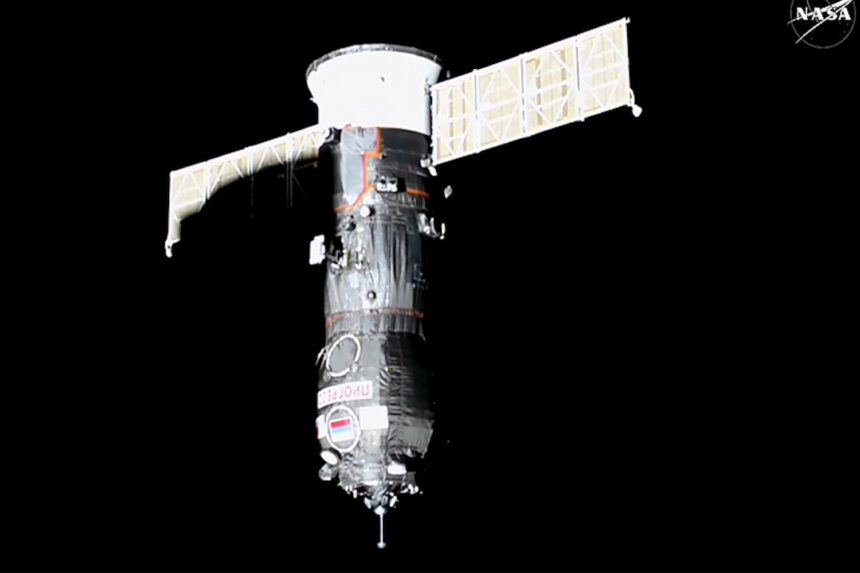A Russian spacecraft docked to the International Space Station (ISS) didn’t just bring supplies to the ISS—it also brought a foul odor. The unpleasant aroma was strong enough to prompt astronauts to close the hatch connecting it to the rest of the space station and initiate anti-contamination procedures.
The Progress 90 cargo ship arrived at the Russian Poisk module at 9:31 a.m. ET on Saturday, November 23, delivering about three tons of food, fuel, and supplies for members of the Expedition 72 crew on board the ISS. After opening the hatch between Progress and the Poisk module, the crew noticed a noxious smell and droplets coming from the cargo ship. The Roscosmos cosmonauts closed the hatch immediately, fearing a possible contamination hazard, RussianSpaceWeb.com reported based on communication between mission control in Houston and the ISS astronauts.
NASA confirmed the report, adding that the foul smell does not indicate a safety concern for the ISS crew. “Space station air scrubbers and contaminant sensors monitored the station’s atmosphere following the observation, and on Sunday, flight controllers determined air quality inside the space station was at normal levels,” NASA wrote on X. “There are no concerns for the crew, and as of Sunday afternoon, the crew is working to open the hatch between Poisk and Progress while all other space station operations are proceeding as planned.
The Russian astronauts reportedly donned protective equipment and activated an air-scrubbing system on board the Russian module to scrub the space station’s atmosphere from possible contamination, according to RussianSpaceWeb.com. The U.S. section of the space station activated its own air-scrubbing system, the Trace Contaminant Control Sub-assembly, while the hatch to Russia’s Poisk module remained closed. RussianSpaceWeb.com added that NASA astronaut Don Pettit reported a “spray-paint like” smell in a U.S. module, but it wasn’t clear whether that smell is related to the Russian cargo ship.
Russia’s Progress 90 cargo ship will stay docked at the ISS for about six months before making a fiery reentry into Earth’s atmosphere, where it will burn up, along with trash loaded onto the spacecraft by the crew.
The space station’s Russian module is already not in great shape. In 2019, an air leak was discovered in the vestibule (named PrK) that connects a docking port to the Russian Zvezda module, which Roscosmos had launched to low Earth orbit in July 2000. Earlier this year, NASA elevated the leak to the highest level of risk as the rate of air escaping from the module had doubled from one pound of air per day to a little over two pounds. The reason behind the leak remains contentious, with NASA and Russia disagreeing on the probable cause.
Russian spacecraft have also experienced issues, with back-to-back coolant leaks taking place in 2022. In December 2022, ground teams observed a fountain of particles pouring out from a Soyuz spacecraft docked to the ISS. Shortly after, a Russian Progress 82 freighter docked to the ISS also began leaking coolant in February 2022.
Tensions are already high between NASA and its Russian counterpart, with Roscosmos hesitantly agreeing to stay on the ISS until 2028 (the space station is due to retire in 2030). The aging hardware is showing signs of wear and tear from the harsh space environment, but the two space agencies can’t seem to agree on the level of severity of these issues.
Read the full article here












